各种从句的英语表达
英语所有从句大全(1)
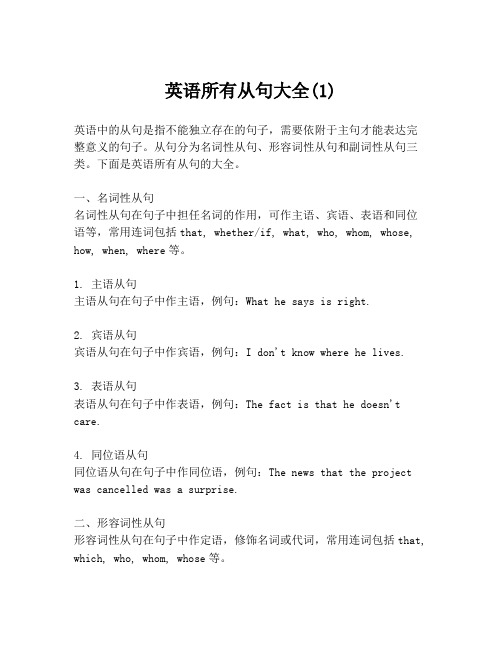
英语所有从句大全(1)英语中的从句是指不能独立存在的句子,需要依附于主句才能表达完整意义的句子。
从句分为名词性从句、形容词性从句和副词性从句三类。
下面是英语所有从句的大全。
一、名词性从句名词性从句在句子中担任名词的作用,可作主语、宾语、表语和同位语等,常用连词包括that, whether/if, what, who, whom, whose, how, when, where等。
1. 主语从句主语从句在句子中作主语,例句:What he says is right.2. 宾语从句宾语从句在句子中作宾语,例句:I don't know where he lives.3. 表语从句表语从句在句子中作表语,例句:The fact is that he doesn't care.4. 同位语从句同位语从句在句子中作同位语,例句:The news that the project was cancelled was a surprise.二、形容词性从句形容词性从句在句子中作定语,修饰名词或代词,常用连词包括that, which, who, whom, whose等。
1. 定语从句定语从句在句子中作定语,例句:A person who loves music will enjoy the concert.2. 条件从句条件从句在句子中作条件,一般用if, unless等连接词,例句:Unless you study hard, you won't pass the exam.三、副词性从句副词性从句在句子中作状语,修饰动词、形容词、副词等,常用连词包括that, if, whether, why, when, where, how, as, because等。
1. 时间状语从句时间状语从句在句子中作时间状语,例句:I will see you when I come back.2. 地点状语从句地点状语从句在句子中作地点状语,例句:He sat where there was shade.3. 原因状语从句原因状语从句在句子中表示原因,例句:He didn't go to work because he was sick.4. 目的状语从句目的状语从句在句子中表示目的,例句:I'm studying hard so that I can get good grades.5. 结果状语从句结果状语从句在句子中表示结果,例句:He is so clever that he can solve the problem.6. 让步状语从句让步状语从句在句子中表示让步,例句:Although he is poor, he is happy.7. 比较状语从句比较状语从句在句子中表示比较,例句:He is taller than I am.8. 方式状语从句方式状语从句在句子中表示方式,例句:He works as if he is the boss.9. 条件状语从句条件状语从句在句子中表示条件,例句:If you study hard, you will pass the exam.四、从句的语序和时态从句中的语序和时态要根据主句来变化。
英语三大从句类型总结
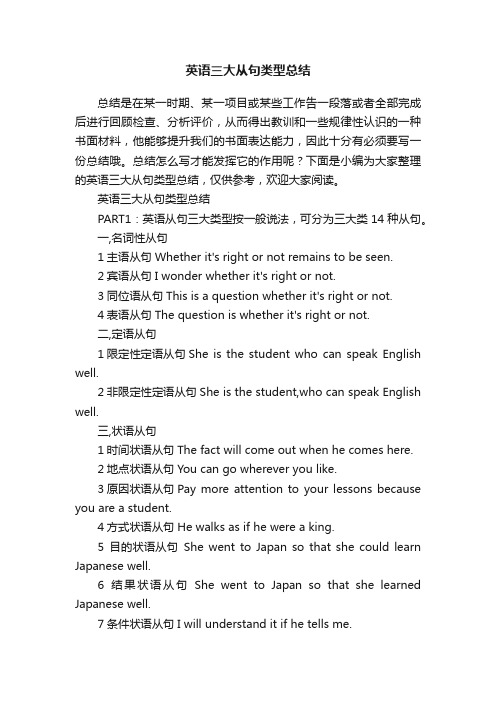
英语三大从句类型总结总结是在某一时期、某一项目或某些工作告一段落或者全部完成后进行回顾检查、分析评价,从而得出教训和一些规律性认识的一种书面材料,他能够提升我们的书面表达能力,因此十分有必须要写一份总结哦。
总结怎么写才能发挥它的作用呢?下面是小编为大家整理的英语三大从句类型总结,仅供参考,欢迎大家阅读。
英语三大从句类型总结PART1:英语从句三大类型按一般说法,可分为三大类14种从句。
一,名词性从句1主语从句Whether it's right or not remains to be seen.2宾语从句I wonder whether it's right or not.3同位语从句This is a question whether it's right or not.4表语从句The question is whether it's right or not.二,定语从句1限定性定语从句She is the student who can speak English well.2非限定性定语从句She is the student,who can speak English well.三,状语从句1时间状语从句The fact will come out when he comes here.2地点状语从句You can go wherever you like.3原因状语从句Pay more attention to your lessons because you are a student.4方式状语从句He walks as if he were a king.5目的状语从句She went to Japan so that she could learn Japanese well.6结果状语从句She went to Japan so that she learned Japanese well.7条件状语从句I will understand it if he tells me.8让步状语从句He knows a lot though he is little.PART2:经典名词性从句主语从句(subject clauses)在复合句中起主语作用的从句叫主语从句。
英语三大从句
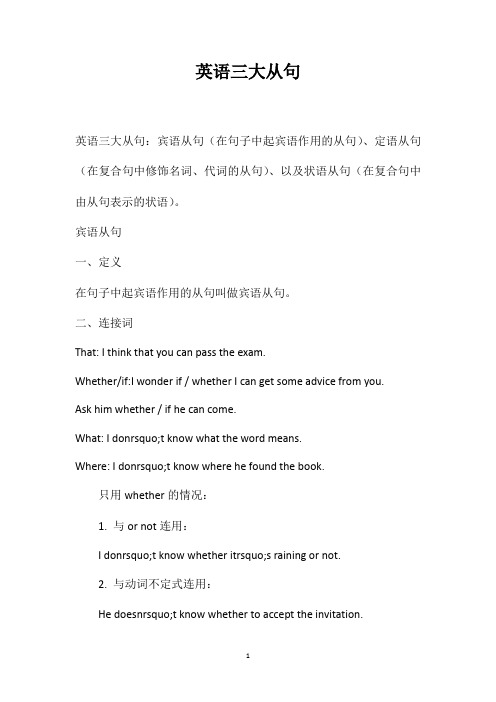
英语三大从句英语三大从句:宾语从句(在句子中起宾语作用的从句)、定语从句(在复合句中修饰名词、代词的从句)、以及状语从句(在复合句中由从句表示的状语)。
宾语从句一、定义在句子中起宾语作用的从句叫做宾语从句。
二、连接词That: I think that you can pass the exam.Whether/if:I wonder if / whether I can get some advice from you.Ask him whether / if he can come.What: I donrsquo;t know what the word means.Where: I donrsquo;t know where he found the book.只用whether的情况:1. 与or not连用:I donrsquo;t know whether itrsquo;s raining or not.2. 与动词不定式连用:He doesnrsquo;t know whether to accept the invitation.3. 连接词前有介词时:It depends on whether he is coming.三、时态1. 主句是一般现在时态,从句根据实际情况而定(各种时态均可)She wants to know what he has done for the exam.2.主句是一般过去时态,从句用相应的过去的时态。
1)She said that she was a student.2)She said that she would fly to Japan in a week.3)She said that she had finished her homework already.3. 如果宾语从句说的是客观真理、自然现象或事实时,这时宾语从句要用一般现在时态。
英语中六大从句用法总结
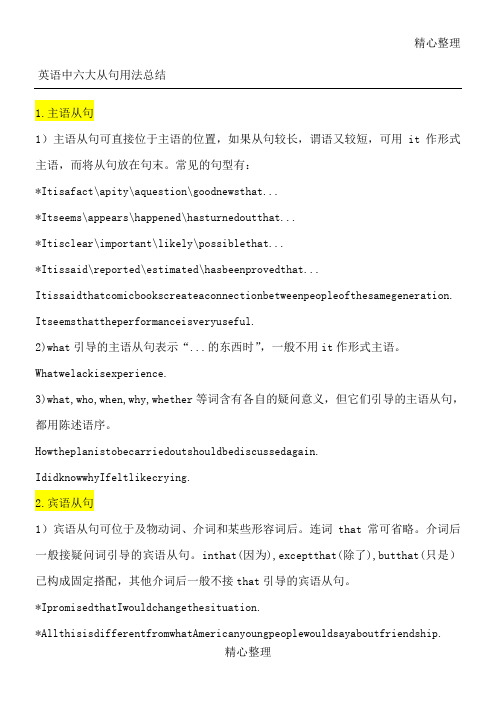
精心整理英语中六大从句用法总结1.主语从句1)主语从句可直接位于主语的位置,如果从句较长,谓语又较短,可用it作形式主语,而将从句放在句末。
常见的句型有:*Itisafact\apity\aquestion\goodnewsthat...1)宾语从句可位于及物动词、介词和某些形容词后。
连词that常可省略。
介词后一般接疑问词引导的宾语从句。
inthat(因为),exceptthat(除了),butthat(只是)已构成固定搭配,其他介词后一般不接that引导的宾语从句。
*IpromisedthatIwouldchangethesituation.*AllthisisdifferentfromwhatAmericanyoungpeoplewouldsayaboutfriendship.*Heiscertainthatwatchingsomuchtelevisionisnotgoodforchildren.*Thisarticleiswell-writtenexceptthatitisabittoolong.2)宾语从句后如有宾补,要用形式宾语it来代替,而把宾语从句移至宾补之后。
Hehasmadeitclearthathewouldnotchangehismind.3)在think,believe,suppose,expect等动词后的宾语从句中,如果谓语是否定的,名词的意义不同,也可用whether,who,when,where,what,why,how等引导。
常见的先行名词有fact,idea,belief,news,hope,conclusion,evidence,suggestion,order,problem, report,decision.有时由于谓语较短,将同位语从句位于谓语之后。
Shefinallymadethedecisionthatshewouldjointhefashionshow.IhadnoideahowmanybooksIcouldborrowatatime. Thenewscamethattheirteamhadwonthechampionship.5.定语从句定语从句所修饰的先行词可以是名词或代词,也可以是一个句子。
英语中各种从句
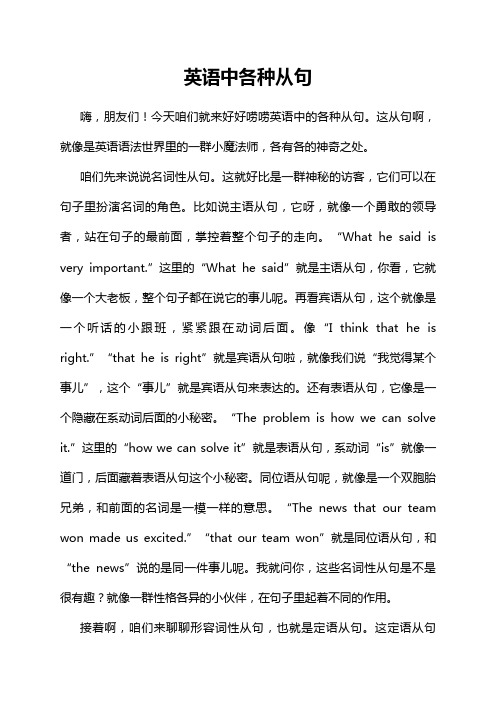
英语中各种从句嗨,朋友们!今天咱们就来好好唠唠英语中的各种从句。
这从句啊,就像是英语语法世界里的一群小魔法师,各有各的神奇之处。
咱们先来说说名词性从句。
这就好比是一群神秘的访客,它们可以在句子里扮演名词的角色。
比如说主语从句,它呀,就像一个勇敢的领导者,站在句子的最前面,掌控着整个句子的走向。
“What he said is very important.”这里的“What he said”就是主语从句,你看,它就像一个大老板,整个句子都在说它的事儿呢。
再看宾语从句,这个就像是一个听话的小跟班,紧紧跟在动词后面。
像“I think that he is right.”“that he is right”就是宾语从句啦,就像我们说“我觉得某个事儿”,这个“事儿”就是宾语从句来表达的。
还有表语从句,它像是一个隐藏在系动词后面的小秘密。
“The problem is how we can solve it.”这里的“how we can solve it”就是表语从句,系动词“is”就像一道门,后面藏着表语从句这个小秘密。
同位语从句呢,就像是一个双胞胎兄弟,和前面的名词是一模一样的意思。
“The news th at our team won made us excited.”“that our team won”就是同位语从句,和“the news”说的是同一件事儿呢。
我就问你,这些名词性从句是不是很有趣?就像一群性格各异的小伙伴,在句子里起着不同的作用。
接着啊,咱们来聊聊形容词性从句,也就是定语从句。
这定语从句啊,就像是一个挑剔的选美评委。
它的任务就是给名词打扮,让这个名词变得更具体、更独特。
“I like the book which/that is very interesting.”这里的“which/that is very interesting”就是定语从句,它就像一个标签,贴在“the book”这个名词上,告诉我们是一本“非常有趣的书”。
各种从句的英语表达
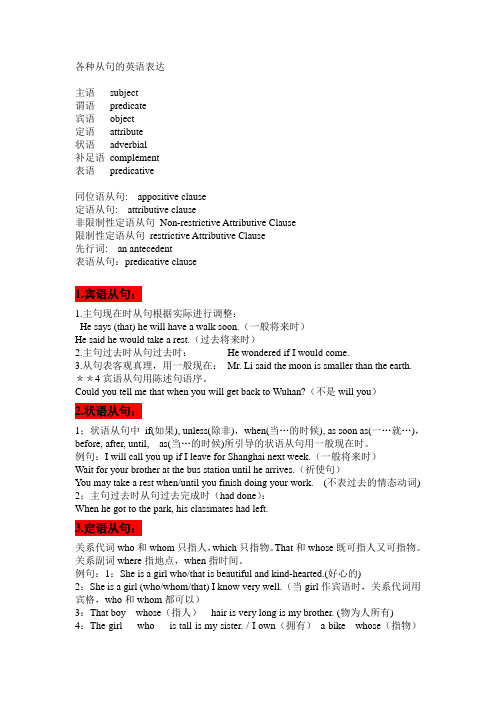
各种从句的英语表达主语subject谓语predicate宾语object定语attribute状语adverbial补足语complement表语predicative同位语从句: appositive clause定语从句: attributive clause非限制性定语从句Non-restrictive Attributive Clause限制性定语从句restrictive Attributive Clause先行词: an antecedent表语从句:predicative clause1.宾语从句:1.主句现在时从句根据实际进行调整:He says (that) he will have a walk soon.(一般将来时)He said he would take a rest.(过去将来时)2.主句过去时从句过去时:He wondered if I would come.3.从句表客观真理,用一般现在:Mr. Li said the moon is smaller than the earth.**4宾语从句用陈述句语序。
Could you tell me that when you will get back to Wuhan?(不是will you)2.状语从句:1;状语从句中if(如果), unless(除非),when(当…的时候), as soon as(一…就…),before, after, until, as(当…的时候)所引导的状语从句用一般现在时。
例句:I will call you up if I leave for Shanghai next week.(一般将来时)Wait for your brother at the bus station until he arrives.(祈使句)You may take a rest when/until you finish doing your work. (不表过去的情态动词) 2;主句过去时从句过去完成时(had done):When he got to the park, his classmates had left.3.定语从句:关系代词who和whom只指人,which只指物。
英语中8种从句介绍-锐
英语中8种从句介绍-锐从句是相对于主句而言的,即它是从属于某一个主句,而不能单独作一个句子.在英语中,主要有三大从句,即名词性从句(包括主语从句,宾语从句,表语从句,同位语从句)、形容词性从句(即定语从句)、副词性从句(即状语从句,包括时间、条件、结果、目的、原因、让步、地点、方式等).主语从句用作主语,如::That the earth is round is true.地球为圆的是真实的.宾语从句用作宾语.如:Do you know where he lives?表语从句用作表语,如:My opinion is that you should not go alone.我的意见是你不应单独前往.同位语从句用于解释说明前面的名词.如:The fact that the earth is round is true.地球是圆的的事实是真实的.(that从句用于解释说明the fact)定语从句相当于一个形容词,用于修饰前面的名词.如:The student who answered the question was John.回答问题的学生是John.状语从句相当于一个副词,如:When it rains,I usually go to school by bus.天下雨时,我通常坐公共汽车上学.(时间状语)If he comes tomorrow,you will see him.如果他明天来,你就可以看见他.(if 引导的条件状语从句,其结构为:if +状语从句,+主句).要注意在状语从句中有一个规则是“主将从现”,即主句是将来时,则从句要用一般现在时表示将来.主句和从句的划分方法是相同的.句子的成分从谓语动词处来划分比较容易.谓语动词前面的部分是主语,后面常接宾语,修饰谓语动词的是状语,修饰主语、宾语的是定语,若谓语是系动词,则系动词后的部分是表语.如:I am a teacher.其中,I 是主语,am是谓语,a teacher 是表语.He likes playing football very mucy.其中,he是主语,likes是谓语,playing football是宾语,very much是状语.英语中8种从句介绍1定语从句2时间状语从句3地点状语从句4条件状语从句5同位语从句6表语从句7宾语从句8主语从句名词性从句:在句子中起名词作用的句子叫名词从句(Noun Clauses).名词从句的功能相当于名词词组,它在复合句中能担任主语、宾语、表语、同位语、介词宾语等,因此根据它在句中不同的语法功能,名词从句又可分别称为主语从句、宾语从句、表语从句和同位语从句.引导名词性从句的连接词引导名词性从句的连接词可分为三类:连接词:that,whether,if 不充当从句的任何成分)连接代词:what,whatever,who,whoever,whom,whose,which.连接副词:when,where,how,why不可省略的连词:1.介词后的连词2.引导主语从句和同位语从句的连词不可省略.That she was chosen made us very happy.We heard the news that our team had won.比较:whether与if 均为"是否"的意思.但在下列情况下,whether 不能被if 取代:1.whether引导主语从句并在句首2.引导表语从句3.whether从句作介词宾语4.从句后有"or not"Whether he will come is not clear.大部分连接词引导的主语从句都可以置于句末,用 it充当形式主语.It is not important who will go.It is still unknown which team will win the match.)由从属连词that引导的从句叫做名词性that-从句.That只起连接主句和从句的作用,在从句中不担任任何成分,本身也没有词义.名词性that-从句在句中能充当主语、宾语、表语、同位语和形容词宾语,例如:主语:That he is still alive is sheer luck.他还活着全靠运气. 宾语:John said that he was leaving for London on Wednesday.约翰说他星期三要到伦敦去.表语:The fact is that he has not been seen recently.事实是近来谁也没有见过他.同位语:The fact that he has not been seen recently disturbs everyone in his office.近来谁也没有见过他,这一事实令办公室所有的人不安.形容词宾语:I am glad that you are satisfied with your job. 你对工作满意我感到很高兴.2)That- 从句作主语通常用it作先行词,而将that-从句置于句末,例如:It is quite clear that the whole project is doomed to failure.很清楚,整个计划注定要失败.It's a pity that you should have to leave.你非走不可真是件憾事一、什么是英语从句?要回答这个问题,先要弄清楚两个小问题:1、什么叫英语的句子一般情况下,英语句子中必定有一个主语和谓语,或者说,有主语和谓语组成的句子就是句子.例如:Mr. Wang teaches English in a middle school.Many trees were planted last spring.2、英语句子的成份英语的句子中,不仅只有主语和谓语,还有其它的句子成份,其中最主要的成份有:主语、谓语、宾语、状语、定语等.这几种成份在句子的位置大致是:(状语) + (定语)主语(定语) + (状语)谓语(状语) + (定语)宾语(宾语补足语) + (状语)也就是,定语一般位于主语和宾语的前后;状语一般位于谓语的前后;及物动词后一般接宾语和宾语补足语.有一点请注意:英语句子中状语的位置非常灵活,它在句首、句中、句末都可以.3、什么是英语的从句在明白了英语句子的成份之后,再来讨论英语从句就比较简单了.因为,什么叫从句呢?就是英语句中的某一成份不是一个单词或词组,而是一个句子,那么这个担任成份的句子就叫从句.如果定语是一个句子,它就叫定语从句;如果宾语是一个句子,它就是宾语从句.依此类推.例如:The boy and the dog [that are in the picture ]are very lovely. (括号中that开始的句子就是定语从句)We revisited the village [where we had worked before.] (括号中where引导的句子也是定语从句)He learned [that this was a hard work (which must be finished in a week.)] (这句里有两个从句,方括号由that引导的是宾语从句;在这个宾语从句中又包含了一个由which引导的定语从句.)因此,对于一个比较复杂的较长的英语句子来说,它就可能存在几个句子,即主句和担任各种成份的从句.从这个角度看,也可以说从句是句子中的句子.二、定语从句(Attributive Clauses)在句中做定语,修饰一个名词或代词,被修饰的名词,词组或代词即先行词.定语从句通常出现在先行词之后,由关系词(关系代词或关系副词)引出.关系代词有:who, whom, whose, that, which等.关系副词有:when, where, why等. 18.1 关系代词引导的定语从句关系代词所代替的先行词是人或物的名词或代词,并在句中充当主语、宾语、定语等成分.关系代词在定语从句中作主语时,从句谓语动词的人称和数要和先行词保持一致.1)who, whom, that这些词代替的先行词是人的名词或代词,在从句中所起作用如下:Is he the man who/that wants to see you?他就是你想见的人吗?(who/that在从句中作主语)He is the man whom/ that I saw yesterday.他就是我昨天见的那个人.(whom/that在从句中作宾语)2) Whose 用来指人或物,(只用作定语, 若指物,它还可以同of which互换), 例如:They rushed over to help the man whose car had broken down. 那人车坏了,大家都跑过去帮忙.Please pass me the book whose (of which) cover is green. 请递给我那本绿皮的书.3)which, that它们所代替的先行词是事物的名词或代词,在从句中可作主语、宾语等,例如:A prosperity which / that had never been seen before appears in the countryside. 农村出现了前所未有的繁荣.(which / that 在句中作宾语)The package (which / that) you are carrying is about to come unwrapped. 你拿的包快散了.(which / that在句中作宾语 18.2 关系副词引导的定语从句关系副词可代替的先行词是时间、地点或理由的名词,在从句中作状语.1)when, where, why关系副词when, where, why的含义相当于"介词+ which"结构,因此常常和"介词+ which"结构交替使用,例如:There are occasions when (on which) one must yield. 任何人都有不得不屈服的时候.Beijing is the place where (in which) I was born. 北京是我的出生地.Is this the reason why (for which) he refused our offer? 这就是他拒绝我们帮助他的理由吗?2)that代替关系副词that可以用于表示时间、地点、方式、理由的名词后取代when, where, why和"介词+ which"引导的定语从句,在口语中that常被省略,例如:His father died the year (that / when / in which) he was born. 他父亲在他出生那年逝世了.He is unlikely to find the place (that / where / in which) he lived forty years ago. 他不大可能找到他四十年前居住过的地方.用关系代词,还是关系副词完全取决于从句中的谓语动词.及物动词后面无宾语,就必须要求用关系代词;而不及物动词则要求用关系副词.例如:This is the mountain village where I stayed last year.I'll never forget the days when I worked together with you. 判断改错(注:先显示题,再显示答案,横线;用不同的颜色表示出.)(错) This is the mountain village where I visited last year. (错)I will never forget the days when I spent in the countryside.(对) This is the mountain village (which) I visited last year.(对) I'll never forget the days (which) I spent in the countryside.习惯上总把表地点或时间的名词与关系副词 where, when联系在一起.此两题错在关系词的误用上.内容提要定语从句是由关系代词和关系副词引导的从句,其作用是作定语修饰主句的某个成分,定语从句分为限定性和非限定性从句两种.状语从句分为时间状语从句,结果状语从句,让步状语从句,原因状语从句,条件状语从句以及行为方式状语从句.名词从句包括主语从句,宾语从句,表语从句和同位语从句及there be句型.一、限定性定语从句1. that即可代表事物也可代表人,which代表事物;它们在从句中作主语或宾语,that在从句中作宾语时常可省略关系词,which在从句中作宾语则不能省略.而且,如果which在从句中作“不及物动词+介词”的介词的宾语,注意介词不要丢掉,而且介词总是放在关系代词which的前边,但有的则放在它原来的位置2. which作宾语时,根据先行词与定语从句之间的语义关系,先行词与which之间的介词不能丢3. 代表物时多用which,但在带有下列词的句子中用that而不用which,这些词包括all, anything, much等,这时的that常被省略4. who和whom引导的从句用来修饰人,分别作从句中的主语和宾语,whom作宾语时,要注意它可以作动词的宾语也可以作介词的宾语5. where是关系副词,用来表示地点的定语从句6. when引导定语从句表示时间〔注〕值得一提的是,表示时间“time"一词的定语从句只用when引导,有时不用任何关系代词,当然也不用that引导By the time you arrive in London, we will have stayed there for two weeks.I still remember the first time I met her.Each time he goes to besiness trip, he brings a lot of living necessities, such as towers, soap, toothbrush etc.7. whose是关系代词,修饰名词作定语,相当于所修饰成分的前置所有格8. 当从句的逻辑主语是some, any, no, somebody, anybody, nobody, something, anything, everything或nothing时,常用there is来引导二、非限定性定语从句:非限定性定语从句的作用是对所修饰的成分作进一步说明,通常和主句间用逗号隔开,将从句拿掉后其他部分仍可成立1. which引导的非限定性定语从句来说明前面整个句子的情况或主句的某一部分2. 在引导限定性定语从句时,that有时相当于in which, at which, for which或at whichAttitudes towards daydreaming are changing in much the same way that(in which) attitudes towards night dreaming have changed. 人们对白日做梦的态度正在改变,这与人们对夜间做梦的看法的变化有非常相似之处.I like the music for the very reason that(for which) he dislike it. 我出于某种原因喜欢这种音乐,而他恰恰与我相反.We arrived the day that(on which) they left. 刚好我们到的那天他们走了.3. 有时as也可用作关系代词4. 在非限定性定语从句中,不能用that,而用who, whom代表人,用which代表事物先行词:是在定语从句中,被定语从句所修饰的名词.例如:He is a teacher who teach our English.在这里定词从句who teach our English是来修饰前面的名词teacher.所以teacher就是一个先行词.再说下它的用法:1、先行词指人时,引导词可用Who,Whom,及that,其中当引导词在句中作主语时用Who或that;当其充当宾语时用whom或that,在非正式宾语中也可用who,也可省略.a That boy who/that broke the window is called Tom.b The person to whom you just talked is Mr Li.b 句可改为:The person(that/whom/who)you just talked to is Mr Li.2、先行词指物时,引导词用that或whicha.They planted the trees which didn’t need much water.b .The fish (which)we bought were not fresh.3、先行词指时间时,引导词用When/on which或in whicha.I still remember the day when/on which I first came to Bei jing.b.I'll never forget the year when/ on which we worked on the farm.4、先行词指地点时,引导词用Where或in whichThis is the house where/in which we lived last year.或:This is the house that/which we lived in last year.5、whose在定语从句中作定语时,可用来指人,也可以用来指物,如:a.This is the boy whose mother died a month ago.b.This is the house whose windows were broken.此句可改成:This is the house the windoues of which were broken.6、先行词表示原因时,引导词用why,如:The reason why he was late for school was that he had been knocked down by a bike.二、物殊情况:尽管有以上基本原则,但要学好定语从句更应注意以下特殊情况;Ⅰ、当定语从句的先行词为表示人的不定代词,如anyone,anybody,everyone,everybody,noone,nobody,all,these ,those等时,用who而不用thatThose who break the rule are pulished.Anybody who had eyes could see the elephant was like a snake. Ⅱ.以who或which作主语的特殊疑问句中先行词指人,引导词只用That,如:a.Who is the person that is standing at the gate ?b.Which of you that knows something about English doesn’t know this word?Ⅲ、先行词指物时引导词用that而不用which的情况:1、先行词有序数词或形容词最高级修饰时,This is the best composition that has been written in English.2、先行词是all,something,anything,nothing,everything,little,few,much等不定代词时There is nothing/little/much that we can do for her.3、先行词被all,every,no,some,any,little,much等修饰时I’ve read all the books that you gave me.4、先行词被the only/very等修饰时This is the very/last place that they visited yesterday. 5、有两个以上先行词,分别表示人或物时They talked about the teachers and the schools that they had visited.6、先行词为基数时Yesterday I caught two fish,Now you can see the two that are still alive in a basin of water.Ⅳ.time为先行词时,前边如有序数词修饰时,定语从句引导词用that或什么也不用,如没序数词修饰时,用when或that均可a.This is the last time(that)I shall give you a lesson.先行词指人时,引导词可用Who,Whom,及that,其中当引导词在句中作主语时用Who或that;当其充当宾语时用whom或that,在非正式宾语中也可用who,也可省略.a That boy who/that broke the window is called Tom.b The person to whom you just talked is Mr Li.b 句可改为:The person(that/whom/who)you just talked to is MrLi.2、先行词指物时,引导词用that或whicha.They planted the trees which didn’t need much water.b .The fish (which)we bought were not fresh.3、先行词指时间时,引导词用When/on which或in whicha.I still remember the day when/on which I first came to Bei jing.b.I'll never forget the year when/ on which we worked on the farm.4、先行词指地点时,引导词用Where或in whichThis is the house where/in which we lived last year.或:This is the house that/which we lived in last year.5、whose在定语从句中作定语时,可用来指人,也可以用来指物,如:a.This is the boy whose mother died a month ago.b.This is the house whose windows were broken.此句可改成:This is the house the windoues of which were broken.6、先行词表示原因时,引导词用why,如:The reason why he was late for school was that he had been knocked down by a bike.。
英语中的各种从句详解
从句一.名词性从句在句子中起名词作用的各种从句统称为名词性从句。
这类从句在句中可担任主语、表语、宾语和同位语,名词从句可以分为主语从句、表语从句、宾语从句和同位语从句。
1.主语从句在句子中担当主语的是一个句子,这个从句就叫作主语从句。
主语从句可以由下列连词、连接代词和连接副词引导,且不能省略。
连词:that, whether连接代词:what, whatever, who, whoever 等连接副词:when, where, how, why(1)由连词that, whether引导的主语从句连词that, whether在从句中的作用只是引导主语从句,它在从句中不担任成分,不能省略,且由that, whether引导的主语从句,多用it多形式主语e.g That the earth is round is true.=It is true that the earth is round.地球是圆的,是一个事实。
Whether he’ll come or not hasn’t been decided.= It hasn’t been decided whether he’ll come or not.(2)由连接代词或连接副词引导的主语从句连接代词who, which和连接副词when, where, how, why都可以引导主语从句,它们分别在从句中担任主语、宾语和状语,不能省略,翻译时,不能把它们译为疑问句,由它们引导的主语从句,也可以用形式主语it引导e.g Who let out the news remained unknown. =It remained unknown who let out the news.谁泄漏了那个消息仍旧无人知道。
When we’ll start is not clear. =It is not clear when we’ll start.我们何时出发还不清楚。
九种英语主语从句
九种英语主语从句英语中,主语从句是一种非常常见的从句结构。
它可以用作句子的主语,起到引出或说明整个句子的作用。
以下是九种常见的英语主语从句的类型及示例:1. 名词从句(Noun Clauses):名词从句作为主语,用于引出或说明某个事物或情况的真相、原因、目的等。
示例:- What he said is true.(他说的是对的。
)2. 代词从句(Pronoun Clauses):代词从句用一个代词作为主语,描述或说明某人或某事。
示例:- It's important that we finish the project on time.(我们按时完成项目非常重要。
)- Whoever wants to join the club can sign up here.(想加入俱乐部的人可以在这里报名。
)3. 形容词从句(Adjective Clauses):形容词从句用于修饰某个名词,作为主语起到描述或说明的作用。
示例:- What you just said is not relevant.(你刚才说的不相关。
)- Where he was born has always been a mystery.(他出生在哪里一直是个谜。
)4. 副词从句(Adverb Clauses):副词从句用于描述或说明一个动作或状态的条件、原因、时间、地点等。
示例:- When he arrives, we can start the meeting.(他一到,我们就可以开始会议。
)- If you study hard, you will pass the exam.(如果你努力研究,你会通过考试。
)5. 不定式从句(Infinitive Clauses):不定式从句用于说明一个动作的目的、结果等。
示例:- To win the game is our ultimate goal.(赢得比赛是我们的终极目标。
英语各种从句的详细讲解
英语各种从句的详细讲解英语从句(Subordination)英语从句主要有定语从句,状语从句和名词性从句(主语从句,宾语从句,表语从句,同位语从句)一.定语从句1.定语从句:由关系代词who,whom,whose,that,which;关系副词when,where,why引导。
1.The death notices tell us about people who have died during the week.2.The man(whom)you spoke to just now is my friend.3.The building whose lights are on is beautiful.4.Please find a place which we can have a private talk in.5.The knee is the joint where the thighbone meets the large bone of the lower leg.6.He still remembers the day when he went to school.7.It is no need telling us the reason why you didn't finish it in time.8.He has three sons,two of whom died in the war.9.Mr.Smith,whose wife is a clerk,teaches us English.10.In the Sunday paper there are comics,which children enjoy.2.只能用that和who引导的定语从句A.all,nothing,anything,a few,one做先行词指物时B.先行词前有形容词最高级修饰时,后面常跟that而不是which.C.先行词前有the only,the first,the last,the next,the very 等词修饰时,引导词只能用that。
- 1、下载文档前请自行甄别文档内容的完整性,平台不提供额外的编辑、内容补充、找答案等附加服务。
- 2、"仅部分预览"的文档,不可在线预览部分如存在完整性等问题,可反馈申请退款(可完整预览的文档不适用该条件!)。
- 3、如文档侵犯您的权益,请联系客服反馈,我们会尽快为您处理(人工客服工作时间:9:00-18:30)。
各种从句的英语表达
主语subject
谓语predicate
宾语object
定语attribute
状语adverbial
补足语complement
表语predicative
同位语从句: appositive clause
定语从句: attributive clause
非限制性定语从句Non-restrictive Attributive Clause
限制性定语从句restrictive Attributive Clause
先行词: an antecedent
表语从句:predicative clause
1.宾语从句:
1.主句现在时从句根据实际进行调整:
He says (that) he will have a walk soon.(一般将来时)
He said he would take a rest.(过去将来时)
2.主句过去时从句过去时:He wondered if I would come.
3.从句表客观真理,用一般现在:Mr. Li said the moon is smaller than the earth.
**4宾语从句用陈述句语序。
Could you tell me that when you will get back to Wuhan?(不是will you)
2.状语从句:
1;状语从句中if(如果), unless(除非),when(当…的时候), as soon as(一…就…),before, after, until, as(当…的时候)所引导的状语从句用一般现在时。
例句:I will call you up if I leave for Shanghai next week.(一般将来时)
Wait for your brother at the bus station until he arrives.(祈使句)
You may take a rest when/until you finish doing your work. (不表过去的情态动词) 2;主句过去时从句过去完成时(had done):
When he got to the park, his classmates had left.
3.定语从句:
关系代词who和whom只指人,which只指物。
That和whose既可指人又可指物。
关系副词where指地点,when指时间。
例句:1:She is a girl who/that is beautiful and kind-hearted.(好心的)
2:She is a girl (who/whom/that) I know very well.(当girl作宾语时,关系代词用宾格,who和whom都可以)
3:That boy whose(指人)hair is very long is my brother. (物为人所有)
4:The girl who is tall is my sister. / I own(拥有)a bike whose(指物)
price is high.
5:I bought a watch (which/that) I paid 100 yuan for. (指物)(paid for是支付的意思)
6:I shall never forget the day when a boy helped me find my dog.
对比7:I prefer a place which/that is clean and quiet.(不完整的句子)
I prefer a place where I can live a quiet life. (完整的句子)
4.感官动词
see, watch, hear, listen to, notice, feel等+动词原形(全过程)/ 动词ing(正在进行)。
特殊:表频率用动词原形。
例句:I heard someone knocking at the door when I fell asleep. (正进行)
I heard someone knock at the door three times. (听的是全过程)
I often watch my classmates play volleyball after school. (频率词often)
**若以上词用于被动语态,动词原形改为带to不定式:
We saw him go into the restaurant with his wife. →
He was seen to go into the restaurant with his wife.
:look, sound, smell, taste, feel +形容词,无被动语态
例句:It sounds good. The flowers smell beautiful.
The sweets taste sweet. The silk feels soft. 丝绸感觉是柔软的。
5.反意疑问句
something, nothing, anything, everything作主语,后面主语用it.
例句:Something is wrong, isn’t it? (前肯后否)
Nothing is difficult, is it?(前否后肯)
特殊:如果有think等词,根据后面从句而定。
I think Lucy can do well in the exam, can’t she?
I don’t think he will come here on time, will he?
主句祈使句后面一般用will you?
Don’t be noisy, will you? Be quiet, will you?
**特殊:Let us 用will you?//Let’s …用shall we?
例句:Let us do it now, will you? Let’s do it now, shall we?
There be句型,后面用there回答.
例句:There is a man working in the field, isn’t there?
There won’t be a movie in the theatre, will there?
6.感叹句
1;What + a/an+形容词+ 名词+(主语+谓语)!
What a good idea! What bad weather (it is)!
2;How +形容词/ 副词+ 主语+ 谓语!
How hard the work is! How fast he runs! How bad the weather is!。
